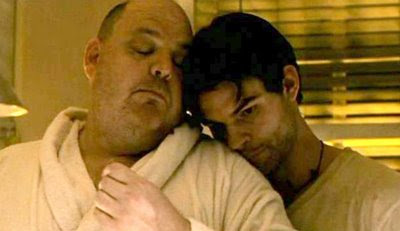Pulse and the Art of Translation
Cultural mores and traditions that inform the themes of films like Kairo or Ju-On are often re-contextualized for a Western audience in their remakes. This isn’t necessarily a bad thing, though some critics would argue it results in a simplification of often complex films. Ju-On for instance becomes a haunted house story, losing the non-linear narrative utilized by Shimizu as it adapts to a more Western understanding of haunted spaces. The same is true of Kiyoshi Kurosawa’s Kairo, known stateside as “Pulse,” but whose title resonates more with the word “Circuit” Whereas Kairo is more about the fear of loneliness and an inability to connect, its remake is more about a threatening Other that seeks our destruction though the gateway of technology.
Pulse is an very psychological film, a departure from the distance Kurosawa keeps us from the disconnected characters of Kairo. Mattie, our main protagonist is psych major who has several sessions with her professor-cum-therapist who tells her that her visions of ghosts in the machine are the result of repressed emotions—guilt and anger over the suicide of her sometimes boyfriend Josh. Our interest in the psychological dimension of these characters is especially Western and smacks of Edgar Allen Poe’s tortured protagonists. This strategy works to some extent as we are invited into the intimate space of these character’s minds to better experience their fear.
Psychology is even used to explain the behavior of the ghosts. In a classroom lecture Mattie listens to the teacher explain the pathological mind that needs to consume the Other, much like the ghosts’ need to consume living human beings.
Pulse attempts to echo Kurosawa’s preoccupation with intense isolation through technology. In the film technology acts as a prophylactic, a barrier between real human interactions. When Mattie’s friends gather at a bar, the aptly named Stone brags to the girls that he has passcodes to a number of sex sites. The internet takes the place of what could be real human intimacy and Mattie’s sepia memories of sex with Josh are the closest we get to seeing a solid human connection—and he dies in the first few minutes of the film.
There is also the introduction of text messaging and cell phones as hindrances to human relationships. Mattie and Josh’s relationship has been “reduced to text messaging” while one of the group texts Mattie from two feet away asking her to dance, to which she replies in person “I’m right here”
While there is still a sense of disconnection in the film, this takes second place to the threatening ghosts on the film’s front burner. The words of one character make it perfectly clear that these ghosts want our lives, which is “what they don’t have anymore”. Instead of inspiring fear with their very presence as proof of eternal loneliness and our fate as disconnected individuals, these ghosts go for the jugular and suck the life from any unfortunate victims they encounter. After “they get their hands on you” the spirits suck your will to live and your body “dies from right under you,” turning into clumps of black ash.
Like in many Western remakes of Japanese horror films, there is also an effort to destroy the threatening Other. In the Grudge Buffy valiantly tries to burn the house down, and in the Ring the frightened mother tries to appease Samara’s angry spirit. These solutions are part of a Western tradition of exorcising the evil and re-establishing the status quo. Pulse follows suit and Mattie with the help of a grease monkey who bought Josh’s computer, uses a virus Josh created to shut down the system, thereby destroying the ghosts. In contrast, Kairo ends quite bleakly with little hope of a resolution. The film’s female protagonist is adrift on a boat with other survivors, but there is little sense of connection between them as the film closes on the indefinite search for more people.
Many of the revisions to the original Pulse can be attributed to post 9/11 fears about invasion that also appear in films like The Strangers. The ghosts of Pulse use our technology to attack us, an idea that might resonate sharply after the hijacking of planes by terrorists to destroy the World Trade Center. This feeling of vulnerability about technology is echoed by a diner patron who preaches his own hysterical theories about the cause of the current disaster “We broadcast, we make ourselves vulnerable and we think we’re safe!” This statement finds parallels with America’s growing role in global affairs and the resulting helplessness exposed by the terrorist attacks.
In the end Pulse is a story of survival and of an ongoing struggle between self and Other. As Mattie and her companion leave the city she meditates on what the future holds:
We can never go back. The cities are theirs. Our lives are different now. What was meant to connect us to one another instead connected us to forces that we never could have imagined. The world we knew is gone. But the will to live never dies. Not for us. And not for them.
The “them” versus “us” rhetoric can be compared with the polarization of Americans and terrorists after 9/11. The “you’re either with us or with the terrorists” speeches by then-President Bush fueled a lasting dichotomy that still dominates the political landscape today.
Kairo and its remake Pulse are excellent examples of the cultural transformation that takes place with American remakes of J-horror. While many of the original meanings are lost, remakes can supply us with a study of our own cultural fears and how we handle them.







Comments
Post a Comment